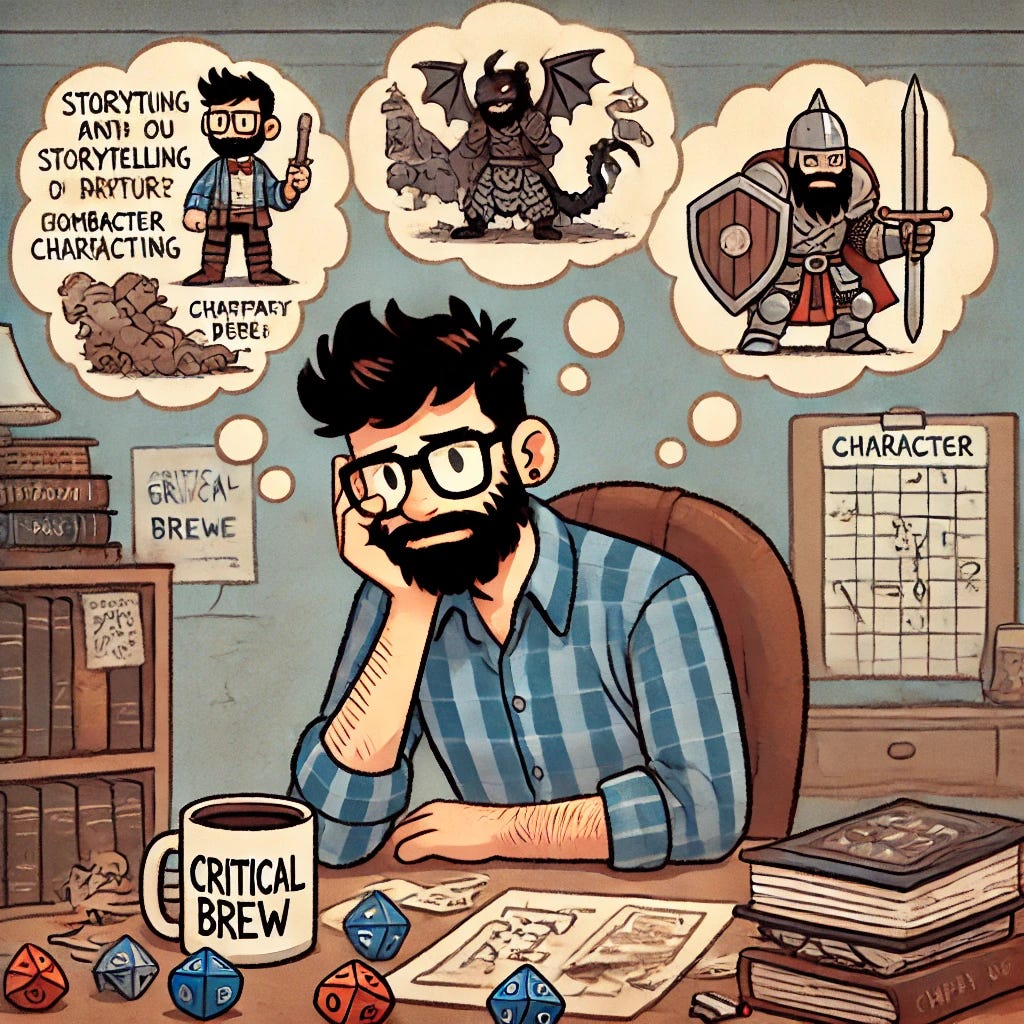"I'm new to solo-roleplaying, how do I actually get started?"
It's one of the most common questions in Solo-TTRPG circles. You see it daily on Reddit, and in tabletop YouTube comments. The interest is clearly there, but the path to getting started isn't as straightforward as we’d all like.
Does this sound familiar? You've downloaded or purchased a game-system or supplement because everyone recommended it, or you've been diving deep into the rabbit hole of GM emulators like Mythic. Maybe you even grabbed an oracle deck, like the Game Master's Apprentice deck. You read through them, got set up and you're excited! But now you're staring at a character sheet and a few results from some roll tables and you’re just told to "start your adventure!", or worse... you’re left with the blank sheet of a notebook — your seeming lack of creativity staring back at you - feeling overwhelmed and unsure on how to actually get going in a meaningful way, you feel frustrated and maybe even defeated. But don't worry, you just need to step back and first ask yourself one question first.
"What do you really want to get out of it?"
This isn't just philosophical — it's crucial. If you're looking at solo RPGs because your regular group keeps canceling and you're hoping to fill that social void — you might want to adjust your expectations. Solo RPGs are great at many things, but they won't replace the dynamic energy of a group session. However, if you love the mechanical challenge of RPGs or the pure joy of storytelling and world building, even if there's only you in the audience — now we're talking.
Some players discover they freeze up when faced with open-ended creative decisions. If you found yourself with Ironsworn staring at prompts to "create an inciting incident" with mounting anxiety. Or, if random table results aren't enough structure to get your creativity flowing — that's completely normal. You might be more comfortable starting with something more structured, like a solo dungeon crawler that gives you clear objectives and frameworks.
Or perhaps you're the opposite — maybe combat mechanics and dungeon layouts feel like tedious bookkeeping that gets in the way of the story you want to tell. You might find yourself more at home with journal-focused games that emphasize character development and worldbuilding over tactical challenges.
“How Can I Figure Out What I Like?”
Here are some questions to ask yourself that might help:
When you read fantasy books or watch movies, do you focus more on the characters' personal journeys, or the exciting action sequences?
In video games, do you prefer open-world exploration or clearly defined missions
Would you rather improvise a character's personality, or optimize their statistics?
Someone who loves traditional group games like D&D for its social storytelling might find they prefer more mechanical solo games because they scratch a different itch. Meanwhile, a tactical miniatures gamer might discover they love the freedom of pure storytelling when there's no audience to judge them.
The key is discovering your personal gaming style that fits your comfort level, but not limit your creativity or enjoyment. If you're struggling with a narrative-focused game, trying something with clean structure isn't "giving up" — it's finding what's fun for you. Similarly, if you find yourself cringing at rigid mechanics, don't feel obligated to stick with them just because they're popular.
"So what kind of solo games are out there?"
As far as I am aware, there isn't any truly universally defined sub-genres. But, there are some common descriptors and types you'll come across. Here are a few:
Narrative-driven games like Ironsworn focus on storytelling first. They give you tools to create and discover your story as you play. Think of them as creative writing with dice adding unexpected twists. These games often ask you to interpret results and expand on them with your imagination.
Procedurally-driven games like Four Against Darkness are highly structured and methodical. They work almost like single-player board games, giving you clear objectives and step-by-step procedures. You'll find lots of random tables and specific rules for what happens next, which can be perfect if you want clear direction.
Journal-driven games emphasize written reflection and character development in a narrative style. Commonly in a journal or diary format. They tend to be less about dice rolls and more about exploring your character's story through guided writing prompts.
Oracle-driven games rely heavily on asking questions and interpreting answers. The Mythic GM Emulator is probably the most famous example — you ask questions, get responses, and build your story from there. These can be used alone or paired with other games.
Rules Lite or OSR games like DCC, Scarlet Heroes, Shadowdark, ICRPG and others that use traditional RPG mechanics with solo-mechanics or supplements. These might feel more familiar if you're coming from regular D&D or other group RPGs.
Remember these are just a few examples, and many games mix and match these approaches and others. The important thing is finding one that matches how you want to play and what you want to get out of role playing.
Hopefully this helps someone narrow down what you're looking for in a solo RPG experience. If it did (or you already knew), you're already ahead of where many people start. Instead of jumping into whatever game is most popular at the time, aim to choose one that aligns with your known preferences, playstyle and let it evolve from there. The beauty of solo gaming is that you can adapt and grow your approach as you go - at your own speed. Start with what feels comfortable and enjoy the learning process and let your personal style grow naturally from there.




